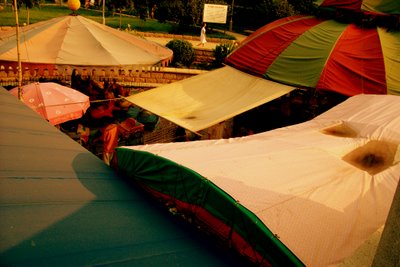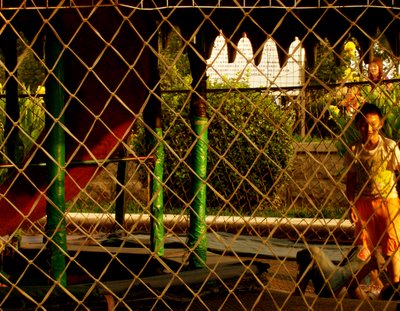I am always surprised by a clear day. But even before I knew it was going to be blue, I knew, it was, admittedly, (potentially) going to be surprising. Or at least today’s class, or at least from “their” perspective. That was the day’s small Hannah challenge.
A friend had remarked in a message that maybe many people back home are baffled as to the everyday of China, its landscape, the clothing people where, all those things that I remember thinking, “like what’s it like over there with that.” So it made me think, yes, people back home don’t know. But what do my teenager students think of our places. Surely they see enough of our world through imported television shows like Friends and Growing Pains, but we know the usual deceits of life on film. But how do they envision the landscape where people are living and moving? Here the streets are never without bikes, pedestrians, or automobiles of some kind. Its impossible to go without seeing a person somewhere. Would they project those preconceptions of boisterous “daily life” onto our “daily life”. For instance, would our pristine, and barely used, suburban parks, in their mind, be as bustling with multi-generations doing hundreds of varieties of activities as they are here? Would our barren suburban playground be beautiful to them? Landscape of the Spare. I wonder, wonder.
But I could not ask these questions today. Not to this group and not directly. The ideas were stewing in my head, and this is usually enough to teach a class, but I couldn’t rely on words and games today. In my usual last half-hour rush to prepare my days lessons I forgo-ed the book chapter (as a treat to both myself and them) and perused my personal photo album that I had brought with me. I just wanted landscapes and cityscapes. I had only a few, but what I did have sufficed to make a learning point, at least in my mind.
Here was the class, in short: I gave them a short passage to read about the different characteristics of cities in Mexico, Japan, and Australia. (which I guess are fairly reflective of developing and developed cities, western vs. eastern, old vs. new, etc.) Anyway the reading was just a way of introducing new words like modern/traditional, urban/rural/suburban, industrial/agricultural/residential. These were hard, hard words for them to not only pronounce but to arrange in an intelligible way with the limited vocabulary that would typically accompany with them. But I knew they could get them eventually. J I’ll skip ahead: I passed out 5 photos and asked them to get into groups and describe the places in the picture. Is it Rural? Are their traditional buildings? Etc. Is it rich or poor? Then I asked them were they thought it was. I never mentioned whether they were taken in China or elsewhere.
The photos were: 1.) Orchard in Provence, France. 2.) Old Mountain Village in France 3.) Me in Tucson, Arizona on a parking garage with the Catalina mountains, city lights, and buildings in the background. 4.) Dad and Keum-Shin standing in front of a bombed Opera House in Dresden, Germany. 5.) The Cote D‘Azure, boats, and the cityscape along the beach in Nice, France.
Again, I’ll skip ahead:: They thought all of them were in China
Whoa.
It is something I was preparing for, but was again surprised by. Its out of the blue, this realization of difference in perspectives striking again. If it is old is it poor? Apparently. If it rich is it good? Absolutely. The modern buildings were in Shanghai in their head. The beach was in Hong Kong in their mind. The provencial countryside was the “poor” Chinese countryside. When I told them where the pictures had come from they all seemed both blown away. They laughed and jumped up a little from their seats. They buzzed a little in Chinese. France is poor? No, its just a country that still has a lot of old and traditional buildings. Are they tearing down that building in Germany? No, they are actually rebuilding it. They were projecting their values on our landscape, culled from their landscape and recent past of divergences, contradictions, and black and whites. Perhaps, any student their age anywhere in the world might think the same way, but if their is anything to learn from this it is that, It's all just kinda the same world, you know? Again, I was surprised. And so were they.
I left the class feeling pretty good and I had the clear blue twilight, for once, to look forward to. If only my camera was working properly I could have taken all the pictures that I kept seeing. How was I feeling? Illuminated, maybe?
A friend had remarked in a message that maybe many people back home are baffled as to the everyday of China, its landscape, the clothing people where, all those things that I remember thinking, “like what’s it like over there with that.” So it made me think, yes, people back home don’t know. But what do my teenager students think of our places. Surely they see enough of our world through imported television shows like Friends and Growing Pains, but we know the usual deceits of life on film. But how do they envision the landscape where people are living and moving? Here the streets are never without bikes, pedestrians, or automobiles of some kind. Its impossible to go without seeing a person somewhere. Would they project those preconceptions of boisterous “daily life” onto our “daily life”. For instance, would our pristine, and barely used, suburban parks, in their mind, be as bustling with multi-generations doing hundreds of varieties of activities as they are here? Would our barren suburban playground be beautiful to them? Landscape of the Spare. I wonder, wonder.
But I could not ask these questions today. Not to this group and not directly. The ideas were stewing in my head, and this is usually enough to teach a class, but I couldn’t rely on words and games today. In my usual last half-hour rush to prepare my days lessons I forgo-ed the book chapter (as a treat to both myself and them) and perused my personal photo album that I had brought with me. I just wanted landscapes and cityscapes. I had only a few, but what I did have sufficed to make a learning point, at least in my mind.
Here was the class, in short: I gave them a short passage to read about the different characteristics of cities in Mexico, Japan, and Australia. (which I guess are fairly reflective of developing and developed cities, western vs. eastern, old vs. new, etc.) Anyway the reading was just a way of introducing new words like modern/traditional, urban/rural/suburban, industrial/agricultural/residential. These were hard, hard words for them to not only pronounce but to arrange in an intelligible way with the limited vocabulary that would typically accompany with them. But I knew they could get them eventually. J I’ll skip ahead: I passed out 5 photos and asked them to get into groups and describe the places in the picture. Is it Rural? Are their traditional buildings? Etc. Is it rich or poor? Then I asked them were they thought it was. I never mentioned whether they were taken in China or elsewhere.
The photos were: 1.) Orchard in Provence, France. 2.) Old Mountain Village in France 3.) Me in Tucson, Arizona on a parking garage with the Catalina mountains, city lights, and buildings in the background. 4.) Dad and Keum-Shin standing in front of a bombed Opera House in Dresden, Germany. 5.) The Cote D‘Azure, boats, and the cityscape along the beach in Nice, France.
Again, I’ll skip ahead:: They thought all of them were in China
Whoa.
It is something I was preparing for, but was again surprised by. Its out of the blue, this realization of difference in perspectives striking again. If it is old is it poor? Apparently. If it rich is it good? Absolutely. The modern buildings were in Shanghai in their head. The beach was in Hong Kong in their mind. The provencial countryside was the “poor” Chinese countryside. When I told them where the pictures had come from they all seemed both blown away. They laughed and jumped up a little from their seats. They buzzed a little in Chinese. France is poor? No, its just a country that still has a lot of old and traditional buildings. Are they tearing down that building in Germany? No, they are actually rebuilding it. They were projecting their values on our landscape, culled from their landscape and recent past of divergences, contradictions, and black and whites. Perhaps, any student their age anywhere in the world might think the same way, but if their is anything to learn from this it is that, It's all just kinda the same world, you know? Again, I was surprised. And so were they.
I left the class feeling pretty good and I had the clear blue twilight, for once, to look forward to. If only my camera was working properly I could have taken all the pictures that I kept seeing. How was I feeling? Illuminated, maybe?




